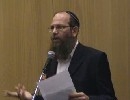Beit Midrash
- Family and Society
- A Nation and its Halachot
Judaism as a faith does not recognize forced conversions as being necessary or even valid. In fact to a great extent Judaism does not search for converts. Rather it allows potential converts to search for Judaism. It therefore never encourages outright proselytization nor is it especially welcoming initially to prospective converts. It emphasizes to the potential convert the "downside" of being a Jew in a hostile and hateful world. It points out that the potential convert by remaining non-Jewish yet retains the immortality of one’s soul and one’s share in the World to Come. This attitude is dramatically exhibited in the conversation between Naomi and Ruth where Naomi attempts to dissuade Ruth from converting to Judaism and following her back to the Land of Israel and the town of Beit Lechem. Yet Ruth persists in her quest to join the Jewish people - "Your God is my God, your people are my people, the obligations of your Torah are my obligations as well." And when the tenacity of Ruth’s determination to convert and the sincerity of her decision become clear to Naomi then Naomi desists from opposing her wishes and Ruth is converted to Judaism by the Jewish court in Beit Lechem. This becomes the paradigm for all of the laws of conversion to Judaism throughout the ages. Those converts who wish to become Jewish because of patently insincere motives are not welcomed for they do neither themselves nor the cause of Judaism any material benefit.
One of the main causes of the rift that led to civil war in Second Temple times between the Hasmonean kings and the rabbinic leaders of the time was the forced conversion to Judaism by those kings of thousands of Idumean tribespeople, a conversion process that the rabbis bitterly opposed and refused to recognize as being religiously legitimate. Eventually through the machinations of the Idumean Antipater and his descendants such as Herod these false Jews came to power and control over the Jewish state and served their Roman masters and not their Jewish subjects. Though it is certainly current common political wisdom never to mention the elephant in the room when discussing publicly such sensitive issues as mass conversions of non-Jews to Judaism the memory of this millennia old incident in Jewish history colors much of the debate regarding the conversion issues that we face today in modern Jewish life. The Torah warns us thirty-six times of the respect and honor due to a convert to Judaism. It is therefore obvious that this is a matter of utmost delicacy and requires great and good judgment by all concerned and should have no place in the political horse trading of a fractious society such as ours.

Semicha and Sanhedrin Controversies of the 16th and 21st Centuries- Part 2
Rabbi Yirmiyohu Kaganoff | Elul 4 5780





















